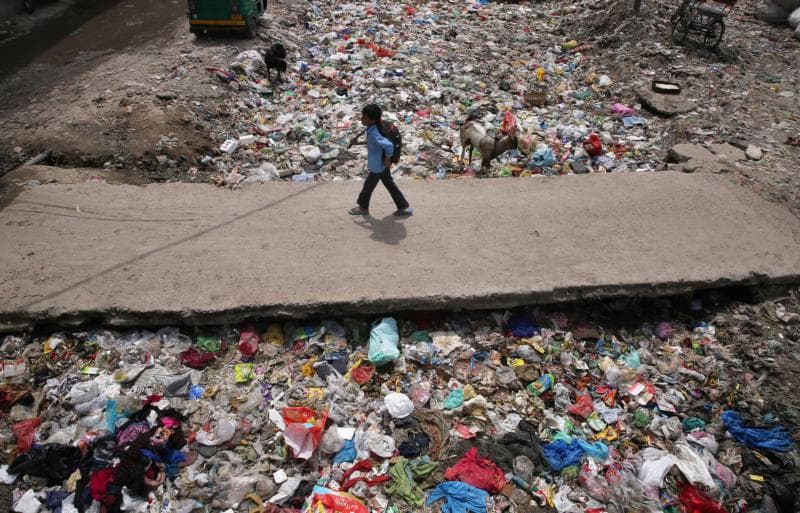MUMBAI, India — Conversion is the key to saving the environment, and the “habits of the heart” must be examined to determine if you are following God’s law.
Father Frazer Mascarenhas S.J., a priest in India who also holds a doctorate in cultural anthropology, recently argued that conversion is a culture-change, a change in lifestyle, in practices, habits, patterns of behaviour and finally in attitudes and values, which are the deepest forms of culture.
He was speaking at an event marking World Environment Day at St. Andrew’s parish in Banda, India.
The priest used the lecture to apply the concepts developed in the 1985 book Habits of the Heart, written by Robert Bellah and his colleagues, sociologists Richard Madsen and Ann Swindler, philosopher Richard Sullivan, and theologian Steven Tipton.
Frazer said that if true spiritual conversion is to take place, we need to change the habits of the heart we have gotten used to, since they are what capture our imagination, what elicit strong emotions and what one feels motivated by – they mold one’s inner being and one’s conscience.
The priest said Pope Francis’s encyclical Laudato Si’ is a call to ecological conversion, and the pope considers care for the environment a justice issue.
“Individual habits like the reuse and recycling of paper and other resources, the saving of water, the reduction of garbage and the picking up of litter around us, the refusal to use plastic – all these are new habits of the heart which we must promote,” Frazer said.
But he added individual practices are not sufficient.
“The major damage to the environment today is through government policies which degrade and deplete the environment in the name of ‘development’ or more appropriately called surplus acquisition,” Frazer told Crux.
“It has been shown clearly that it is the poor who bear the consequences of such degradation as they do not have an economic buffer to cushion the impact,” he continued. “Hence instead of taking care of the vulnerable, the Indian state is taking advantage of their defenseless condition.”
Frazer has urged people to launch a ‘Movement of Catholics’ to save the environment, joining the larger civil society action movement, and making elected representatives accountable for the formulation and implementation of ecological policies.
The priest said this is also “our religious duty,” adding “this is the call of Pope Francis.”
Frazer pointed to practical examples, including a suggestion for India to turn away from nuclear power and invest more in solar energy.
He pointed out that solar energy in a country like India has immense potential and it is free, unlimited and not polluting or dangerous in any manner. Frazer has even put solar power cells on the roof of his own parish church, which he said supplies 70 percent of the power needs of both the church and the parish school.
Frazer said that a new set of habits of the heart are required even more, both at the individual and societal level, now that U.S. President Donald Trump has announced he is pulling out of the Paris international climate agreement.
“Ultimately, Bellah’s conclusion, that our inter-connectedness with one another, and in the present case of the ecology, our inter-connectedness with nature, needs to be acknowledged,” Frazer told Crux. “Our spiritual responsibility is to save our God-given common home.”
He also said the world described in the book – the United States of the 1980s – still has lessons for the India of today.
“Bellah’s American society in the 1980s and 90s was divided by huge disparities between social groups, leading to a breakdown in the distributive justice that a democracy attempts,” Frazer explained.
“India today seems to be in an even worse condition, with new habits of the heart taking root which militate against the democratic spirit: the justice of the lynch-mob; the abuse of processes of the law to harass …; the stifling of dissent even on the campus of educational institutions – the very place where dissent and debate must have free flow; the damaging neglect of funding for public health and education; the demolition of labor laws which protect the dignity of workers; and even the irreversible degradation of the environment for small, short-term economic gains,” he said.
“The plural, more equitable, participative society that India was trying to construct has, it seems, all come crashing down,” the priest continued, pointing out how vulnerable communities are often exploited and religious minorities attacked by non-state actors affiliated with those in power.
Frazer said justice, therefore, is an area where there is a need to have a change in the habits of the heart.
He asks: “Are we paying a just wage to people who serve us, are we looking to defend labour laws that safeguard the dignity of workers, do we discriminate on the basis of caste, gender or appearance?”
He said the habits of the heart in this area must be examined, to see if we are truly practicing God’s law.
















